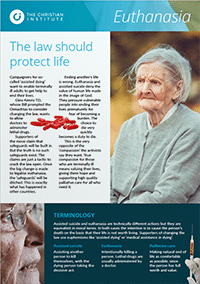A mother who was given a life sentence for the ‘mercy killing’ of her brain damaged son is appealing against her conviction for murder.
Frances Inglis killed her son Thomas by injecting him with a lethal dose of heroin in November 2008 after a previous attempt to kill him failed.
Last week Mrs Inglis appeared briefly in the Court of Appeal for the start of proceedings, but the 58-year-old asked for a delay because she wasn’t happy with the case that her defence lawyers had prepared for her.
Euthanasia
Mrs Inglis’ appeal, which is being supported by the pro-euthanasia group Dignity in Dying, is likely to intensify the current debate on euthanasia.
During her trial, which was held earlier this year, she told the jury that she acted “with love”.
But her oldest son Alex told the court that his mother was “constantly frantic and crying and just in a crazy state. You couldn’t speak to her.”
And it was also disclosed that Mrs Inglis, who was studying for a nursing diploma, refused to accept an encouraging prognosis by a doctor and was convinced that her son was in constant pain.
Vulnerable
Critics have consistently warned that the existing laws on assisted suicide and euthanasia are there to protect the most vulnerable members of society.
But Sarah Wooton, Chief Executive of Dignity in Dying, defended Mrs Inglis’ actions, saying: “She’s been tried under murder law and murder law lacks the flexibility to look at her motivation as well as her intention”.
She added: “Obviously she intended to kill him but her motivation was compassion.”
Frances Inglis was found guilty of both murder and attempted murder in her trial earlier this year, and was sentenced to life with a minimum jail term of nine years.
Force
Last week Tony Nicklinson, a severely disabled man, began a legal challenge to force the Director of Public Prosecutions to issue guidance clarifying whether his wife would be prosecuted for murder if she kills him.
Mr Nicklinson is so severely disabled that he would be unable to take part in his own assisted suicide, and his legal team claims that the current law on murder represents a “disproportionate interference” with his human rights.
But Dr Andrew Fergusson, from Care Not Killing, cautioned: “Old people often feel a sense of burden and don’t see the point of living.
“And I think large numbers of people – the elderly, the depressed, and the disabled – would be put almost under a sense of duty to die if we were to change the law.”


